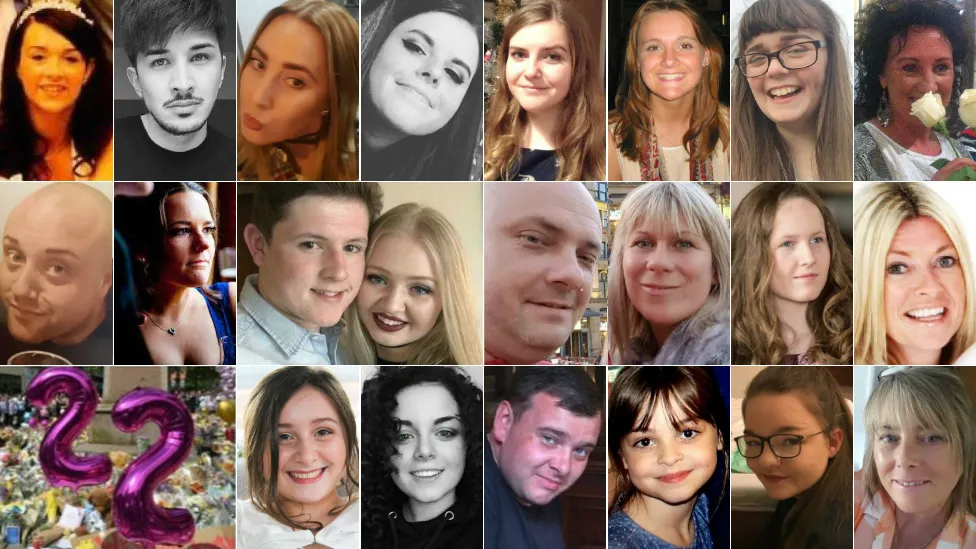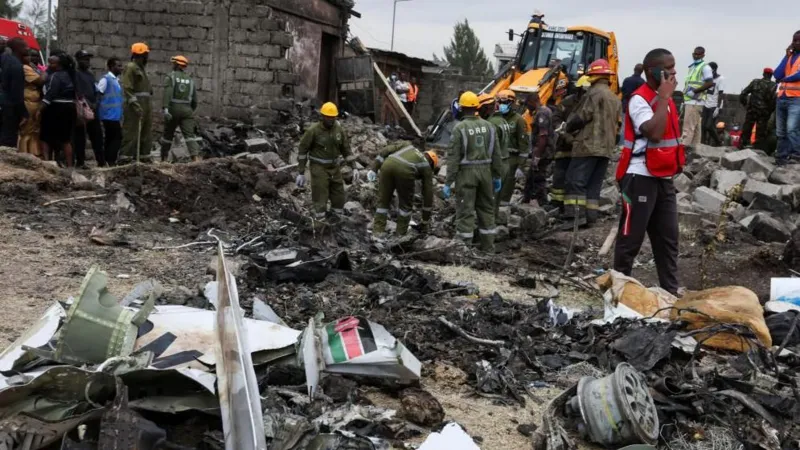Manchester bomber friend known to MI5, BBC reveals
A Muslim preacher who was close to the Manchester bomber had been suspected by MI5 of being a radicaliser more than a decade earlier, the BBC can reveal.

A public inquiry into the atrocity will this week report on how Salman Abedi was radicalised, and whether security services missed chances to stop him.
The preacher, Mansour Al-Anezi, had been investigated before another close associate of his tried to carry out a suicide bombing in Exeter in 2008.
Al-Anezi died before the arena attack.
Twenty two people died in the bombing. Secret hearings, which excluded victims' families, discussed evidence from MI5 about Abedi and associates who were known to the security service.
A BBC investigation has identified information that did not appear in the public hearings - and might not have appeared in the closed sessions either.
Suicide bombings, both actual and attempted, are rare in the UK. In the past 15 years, the only two confirmed incidents were the Manchester and Exeter bombings.
An explosion in a Liverpool taxi in 2021, which killed the bomb maker, has not been publicly confirmed as an intentional suicide bombing.
The fact that both Manchester and Exeter involved associates of Al-Anezi could be a coincidence. But the BBC has discovered that the authorities were investigating him as a suspected radicaliser before the Exeter attack.
The officer who led the Manchester investigation, Detective Chief Superintendent Simon Barraclough, told the arena inquiry that the relationship between Al-Anezi and Salman Abedi was "clearly a connection of significance", but police were unable to establish exactly what it was.
The inquiry also heard Al-Anzei had been arrested in connection with the Exeter attack. But the public hearings were not told he was investigated by MI5 before that.
The preacher, who was not charged, regularly led prayers at a Plymouth mosque frequented by the bomber, a Muslim convert called Nicky Reilly, then aged 22.
Reilly had learning difficulties and Asperger's Syndrome. His family considered him vulnerable and influenced by people he met.
He was the only one injured when a nail-bomb partially exploded in the toilet of a busy restaurant as he was preparing to detonate three devices.
He died in prison in 2016.
Salman Abedi carried out the Manchester Arena bombing on the ninth anniversary of the Exeter attack.
AI-Anezi, said to be 43 and from Kuwait, came to the UK in 2000. He initially stayed in Manchester before moving to Plymouth.
Investigators in Devon were warned by MI5 when Al-Anezi moved there. He was monitored at a Plymouth mosque where he preached, and MI5 collected intelligence on his activities.
Al-Anezi was close to Reilly and came under suspicion after the Exeter incident. Detectives did not have evidence to charge him, but he was subject to further investigation.
Simon Hall, a Cambridge lecturer who was previously a BBC correspondent in south-west England, recalls witnessing a surveillance operation around Al-Anezi in the months after the Exeter attack.
Hall says he was asked not to approach Al-Anezi in Plymouth one day by plain-clothed investigators who were waiting for him at the same location.
A report by Hall on Al-Anezi was broadcast after Reilly's conviction. It couldn't name the preacher for legal reasons.
Two sources who ran the mosque where Al-Anezi led prayers said after Exeter attack he was barred from preaching. He was told "no politics", one told the BBC.
During a later immigration case, Al-Anezi accepted there had been concern about his opinions and that some worshippers had complained.
Close to the Abedi brothers
Although he kept a flat in Plymouth, Al-Anezi visited Manchester and at some stage came into contact with Salman Abedi. He stayed at the Abedi family home in the city. After the bombing, items belonging to Al-Anezi were found there.
He was also in phone contact with Hashem Abedi, who worked with his brother Salman to plan the attack.
Salman Abedi was at Al-Anezi's bedside when he died in a Plymouth hospital in January 2017. Another close associate of his was also present and told the BBC that Abedi was in tears
Salman and Hashem Abedi attended Al-Anezi's funeral in Manchester. The following day, they took a major step in their bomb plot by buying chemical used to make explosives.
Different aliases
Evidence gathered by the BBC suggests Al-Anezi used different aliases, and that his real name might have been something else entirely.
A 2009 asylum judgment, released to the BBC, reveals he accepted arriving in the UK on a "fake passport" under the name Nasar Al Ajmi, but he claimed the document was destroyed and he could not recall the airport he arrived at.
The government argued he "wished to conceal information" and had "fabricated his claim for asylum".
He had argued that he was a Bedouin - a minority in Kuwait - and gave accounts of persecution. The judge at his appeal accepted his accounts were credible.
The BBC, however, has found inconsistencies in his story.
The appeal judgment records Al-Anezi as having stated that his parents were dead, and that "he had one brother who was lost", having not returned from a shopping trip in Kuwait.
But Al-Anezi's funeral notice at a Manchester mosque said he left behind parents and siblings in Kuwait. The BBC has been told by one associate of his how Al-Anezi arranged for thousands of pounds to be sent to a brother abroad following his death. The brother is said to have revealed Al-Anezi was named Mohammed Idrisi and had Egyptian heritage.
Potential influences
The inquiry has also examined other potential influences on Salman Abedi, including during his time at Didsbury Mosque in Manchester.
The BBC has discovered two other young men who attended the mosque died in conflict abroad. They were lionised as martyrs online, before the Arena bombing.
One was briefly mentioned at the inquiry by a former Didsbury Imam, who has criticised those running the mosque. He said extremists were able to attend.
Mohamed El-Saeti, the former Imam, said one young attendee had "joined ISIS and al-Qaeda" in Libya and died fighting there.
The mosque has said it has always made clear the "barbaric" arena bombing had nothing to do with the mosque, Islam, or the Quran, adding it was a "diversion from focusing on the very real failings of those agencies with a duty to protect the public and prevent such attacks".
The BBC has seen online posts lionising the young man mentioned by Mr El-Saeti. Abdulla Fieturi's death was referenced by friends of the Abedi brothers, including a former suspect in the arena attack, another Manchester resident Zuhir Nassrat.
Nassrat called him a "shaeed" - martyr - and told a relative "you should be happy". In response, the relative said he was "proud" as the boy "always wanted to die shaheed".
Zuhir Nassrat is in Libya but wanted by police for his role in a drugs conspiracy involving friends of the Abedi brothers.
The inquiry's public hearings did not consider another young man who died abroad, nor his father who knew Salman Abedi.
His father, Taher Nasuf, regularly attended Didsbury mosque. He was known to British authorities as he spent years sanctioned by the United Nations for alleged connection to the Libyan Islamic Fighting Group, which was then banned in Britain as an al-Qaeda affiliate. He denied the allegations and was never charged with any offence. The personal sanctions were eventually lifted in 2011. He did not respond to attempts by the BBC to make contact.
He was part of a legal political group, the Libyan 17 February Forum, which met at the mosque.
Salman Abedi attended one of its demonstrations in London and was filmed smiling during a speech by Mr Nasuf.
The BBC has been told Mr Nasuf's son Reda, who attended Didsbury mosque, also died in conflict abroad. In online posts, he was described as a martyr, including by another Didsbury Imam, Mustafa Graf. A further image shows him wearing military clothing and another alongside Abdalraouf Abdallah, who was later convicted of terrorism offences for facilitating the movement of fighters and money to Syria.
The inquiry has examined whether Abdallah had a radicalising influence on Salman Abedi.
Families 'disappointed'
Asked for reaction to all the BBC's evidence, a group of five families bereaved by the Manchester attack told the BBC they are "disappointed to learn of yet more links to terrorism in Abedi's background which do not appear to have been investigated".
The families are those of Kelly Brewster, 32, from Sheffield, Eilidh MacLeod, 14, from Barra, Megan Hurley, 15, from Liverpool, and Liam Curry, 19, and Chloe Rutherford, 17, both from South Shields.
"If there is enough information in the public domain for the press to make these links then we would have expected the government to do the same and investigate fully," they said in a statement to the BBC.
The families say: "We can only hope that this information was discussed in the closed hearings of the public inquiry."
They are critical of MI5 given how much was known by the service about the Abedi family.
A spokesman for the Home Office said: "Our thoughts remain with those who were killed or had their lives changed forever at the Manchester Arena attack."
-bbc






